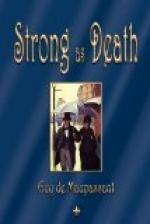“Heavens, now pretty she is in black!” he said.
And he turned toward the Countess while admiring the daughter, as if to thank the mother for having given him this pleasure.
When they returned to the drawing-room the moon had risen above the trees in the park. Their somber mass appeared like a great island, and the country round about like a sea hidden under the light mist that floated over the plains.
“Oh, mamma, let us take a walk,” said Annette.
The Countess consented.
“I will take Julio.”
“Very well, if you wish.”
They set out. The young girl walked in front, amusing herself with the dog. When they crossed the lawn they heard the breathing of the cows, which, awake and scenting their enemy, raised their heads to look. Under the trees, farther away, the moon was pouring among the branches a shower of fine rays that fell to earth, seeming to wet the leaves that were spread out on the path in little patches of yellow light. Annette and Julio ran along, each seeming to have on this serene night, the same joyful and unburdened hearts, the gaiety of which expressed itself in graceful gambols.
In the little openings, where the wave of moonlight descended as into a well, the young girl looked like a spirit, and the painter called her back, marveling at this dark vision with its clear and brilliant face. Then when she darted away again, he took the Countess’s hand and pressed it, often seeking her lips as they traversed the deeper shadows, as if the sight of Annette had revived the impatience of his heart.
At last they reached the edge of the plain, where they could just discern, afar, here and there, the groups of trees belonging to the farms. Through the milky mist that bathed the fields the horizon appeared illimitable, and the soft silence, the living silence of that vast space, so warm and luminous, was full of inexpressible hope, of that indefinable expectancy which makes summer nights so sweet. Far up in the heavens a few long slender clouds looked like silver shells. Standing still for a few seconds, one could hear in that nocturnal peace a confused, continuous murmur of life, a thousand slight sounds, the harmony of which seemed like silence.
A quail in a neighboring field uttered her double cry, and Julio, his ears erect, glided furtively toward the two flute-like notes of the bird, Annette following, as softly as he, holding her breath and crouching low.
“Ah,” said the Countess, standing alone with the painter, “why do moments like this pass so quickly? We can hold nothing, keep nothing. We have not even time to taste what is good. It is over already.”
Olivier kissed her hand, and replied, smiling:
“Oh, I cannot philosophize this evening! I belong to the present hour entirely.”
“You do not love me as I love you,” she murmured.
“Ah, do not—”




